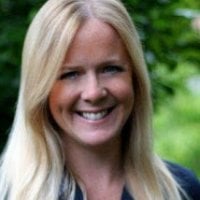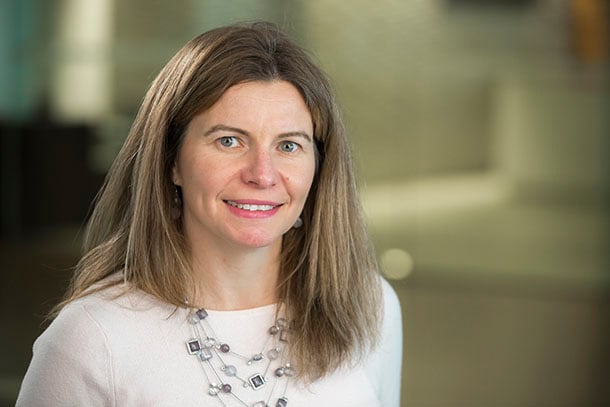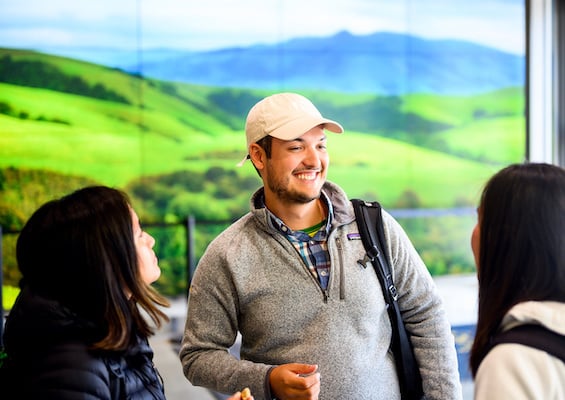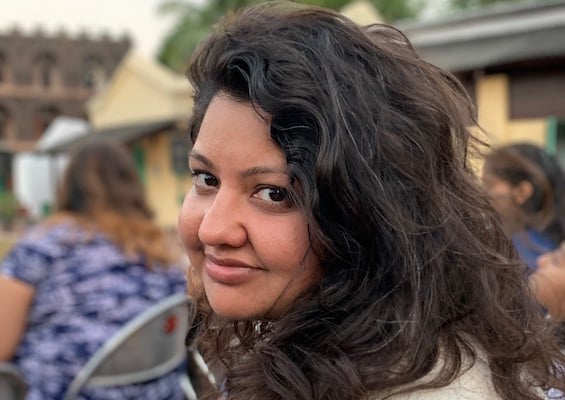Welcome to our series featuring women who are leading innovation, growth, and success in various industries. Today we talk with two Haas alumnae making an impact in the healthcare industry and learn how the Berkeley MBA helped them get where they are today.
Sara Fernandez, MBA 14, pictured above, is co-founder and COO of Healthcentrix, a digital health startup coordinating and automating care outside the clinic for more convenient, efficient, and effective care delivery. She previously worked at Amerisource/Bergen, Xcenda, and McKinsey.
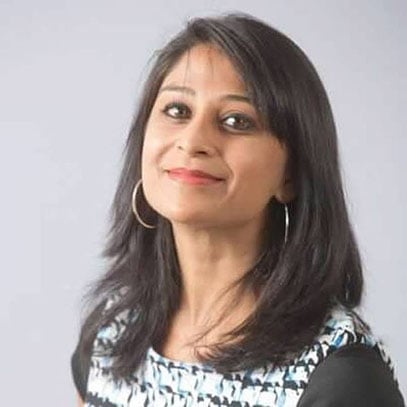
Shruti Nathan, EMBA 15, is the vice president of Strategy for AMITA Health, the largest faith-based healthcare delivery system in Illinois. Her role includes identifying partnership opportunities to grow the organization, optimizing service line distribution for increased access and maintaining the system’s overall network integrity. Prior to AMITA Health, Shruti worked in strategy & business development at Sutter Health.
The conversation has been edited for length.
What about the healthcare space has been bugging you lately, and how would you change that?
Shruti (AMITA Health): Both as a healthcare consumer—as we all are—and as someone working in the delivery side of the industry, the lack of price transparency is a big problem. The bills are too complicated and too high. The US now spends 18% of GDP on healthcare—more than any other nation—and that percentage is only going to increase. We need to solve for that, to simplify billing so people—both patients and providers—understand what is being billed and paid for.
Sara (Healthcentrix): I’m frustrated by the lack of change in the healthcare system, specifically in the US, where the system is built on profit. The result is a system where everyone wants to protect their own turf. Socialized medicine, in all its different forms, works well elsewhere in the developed world, and could work here, except that it has become politicized in a very negative way.
That said, I do see opportunity to make change at the most basic level: in the patient/provider relationship. That is where Healthcentrix is working. Our cloud-based system promotes ongoing, frequent interactions outside of the clinic visit to promote prevention and disease management before the patient reaches crisis stage.
Shruti: I agree, the pace of change is slow. We are slow to implement technology. Getting FDA approval of new drugs and devices is a slow process. Healthcare is somewhat of a dinosaur industry. Instead, we should be on the cutting-edge of change.
Where do you want to take the healthcare industry, and where do you see your role and your company fitting in?
Shruti: I think we need to work on healthcare accessibility. AMITA Health is committed to improving access to high quality care across all services and in every community we serve. We provide a full spectrum of care from birth through end-of-life care, and all that happens in between. That means making sure we have the right facilities and providers in place, and just as important, a seamless transfer system between facilities and providers. My role includes developing and maintaining an operations strategy that accomplishes that. I’m also responsible for growing the organization through a comprehensive assessment of the market and projection of future trends.
Sara: At Healthcentrix we want to move the needle on effective preventive care delivered through regular contact between patient and provider. For example, instead of someone with a chronic condition seeing a doctor twice a year for check-ups, a provider using our technology can remotely monitor a patient’s vital signs and automatically modify his or her care plan. This is more convenient and more cost-effective than the current model. Right now, we’re in a pilot with a handful of primary care physicians who are using the technology with 2,000 patients. We’re also in discussions with a couple of teaching hospitals. Because we see this as the future of healthcare delivery, that is a good place to introduce our technology to tomorrow’s providers.
Fearlessness is important. So is authenticity. When I found my authentic leadership style, I came out of the shadows and gained visibility and influence."
You both have undergraduate degrees that aren’t totally aligned with what you’re doing now. How did you make the leap, and what prepared you for your current role?
Shruti: From as early as I can remember, I wanted to be a doctor. I even started university in pre-med but ended up changing my major to architecture. However, I was able to marry my passion for healthcare and interest in architecture by pursuing healthcare architecture. After over a decade of master facility planning and design, I realized that while bricks and mortar are important, the real opportunity lies in optimizing for cost-efficiencies while improving quality, by innovating with technology and integrating healthcare systems. That is when I realized I needed an MBA to move my career to the strategy side.
Sara: I studied chemistry as an undergrad and for my PhD, and did postdoc work in biochemistry. From there, I went to work at McKinsey. It was while I was at Xcenda, consulting with clients in oncology, biosimilars, and digital health, among others, that I enrolled in the evening & weekend MBA program at Haas to improve my business knowledge. Just eight months ago, I joined Healthcentrix.
Moving from a career in large companies to a startup means I do it all now, and I rely on the skills and knowledge I gained at Haas. But perhaps the most important skill I learned in my MBA was flexibility and the ability to be comfortable with uncertainty.
Shruti: I appreciated the way Haas curated my classmates in the Berkeley MBA for Executives. They all were able and willing to articulate their experiences so we learned not just from our professors and books, but from each other. You may be able to learn corporate finance anywhere, but you can only tap into the Haas culture at Haas.
Which resources at Haas made the greatest difference for you?
Shruti: The networking opportunities, without a doubt. Two encounters with people at events sponsored by the Haas Healthcare Association ultimately led to my being hired. But at the end of the day, it is definitely the quality of the trusted network that I know I can lean on whenever I need it.
Sara: I agree about the quality of the larger network, but my classmates were the best resource possible. Their work experiences added so much to our discussions. Where else would you have people at companies like Google, Amazon, and Netflix all in the same place, raising their hands to say, “This is how we approach that issue."
Shruti: Absolutely! I call on my Haas buddies for advice all the time! Our class’s WhatsApp group continues to serve as a platform wherein we brainstorm, affirm each other, and share our perspectives on everything from recruiting for talent to getting hired, from negotiating deals to managing salary expectations.
I also appreciate that Berkeley Haas is part of a fully integrated campus. I took design classes at the School of Engineering, and audited classes at the School of Law and the School of Public Health.
Sara: And now that I’ve graduated, the ability to audit classes is amazing. When the window opens to register for spring classes, I’ll be at my computer making my selections! Haas makes it easy to be a Student Always.
What is the best piece of advice you would give to a woman aspiring to leadership in any industry?
Sara: Don’t be afraid. I’ve learned to be confident, even when surrounded by uncertainties.
Shruti: I agree. Fearlessness is important. So is authenticity. When I found my authentic leadership style, I came out of the shadows and gained visibility and influence.
Read more from the Women in Leadership series:
